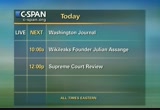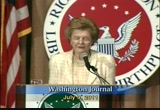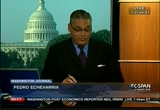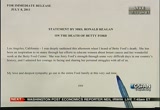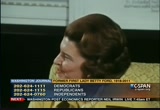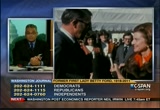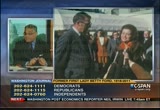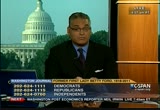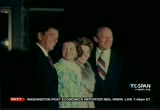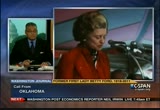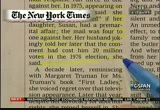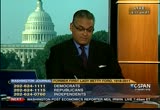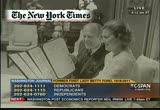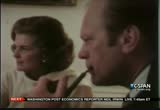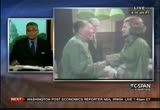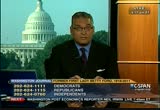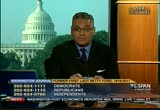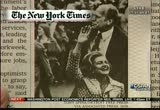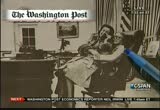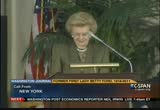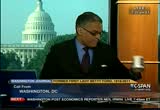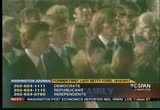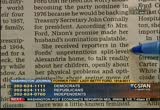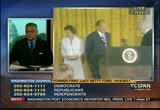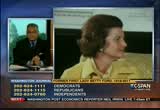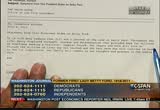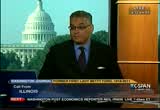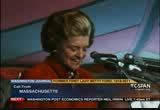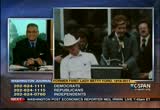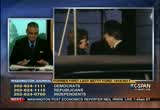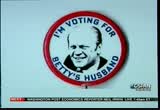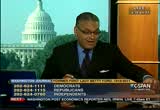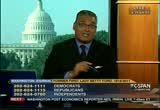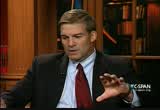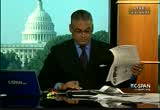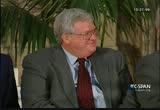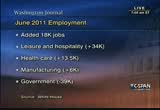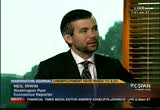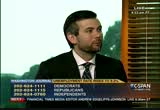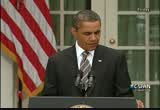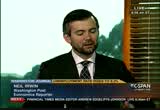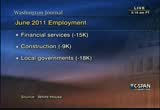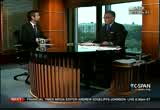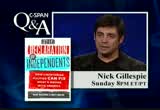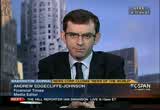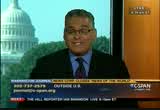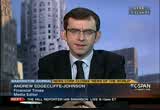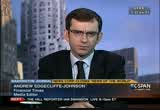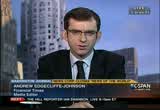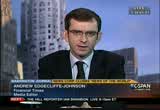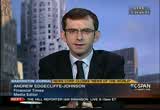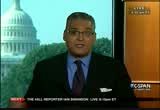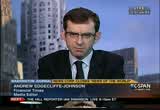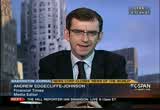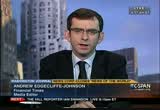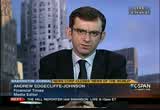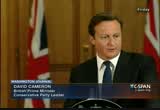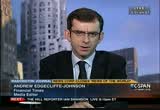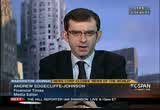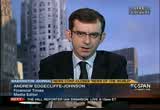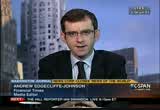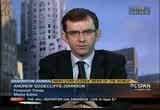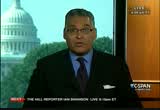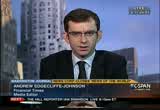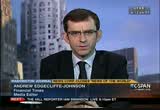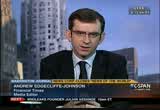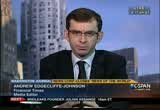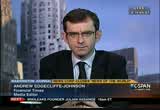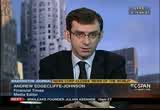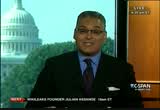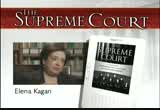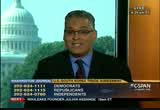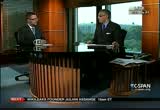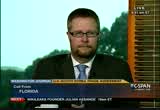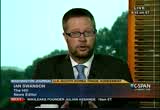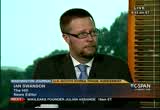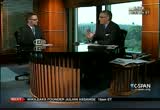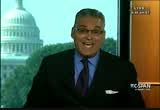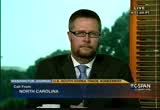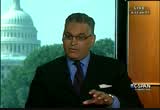tv Washington Journal CSPAN July 9, 2011 7:00am-10:00am EDT
7:00 am
of wikileaks, julian assange, and a review of the supreme court's last term from the heritage foundation. beginning in 45 minutes, it looked at the latest employment figures. levitt discussion about the british phone hacking scandal. also, we will talk about the pending free-trade agreement with south korea. >> as i think back over the years when we were politically active, the events that had the biggest impact on my left was the day my husband took the oath of office as president of the united states. nothing can compare to that moment. i did write about it in my book. i wrote about it as the saddest day of my life. president nixon had resigned and the nixon first family we loved so dearly or leaving the white
7:01 am
house. i will never forget. former first lady betty ford is remembered for her social issues. she passed away today. we want to get your thoughts on her influence as a first lady and especially her legacy after leaving the white house. to make your comments, the phone numbers are on the screen. if you want to share your thoughts on the passing of betty ford, you could do so via email at journal@c-span.org.
7:02 am
this is president obama saying that throughout her long and active life, she distinguished herself through her courage and compassion. she was a powerful advocate for women's health and women's rights. after leaving the white house, mrs. ford conquered the social stigma surrounding addiction. her death as a cause of sadness, organizations such as the betty ford center will honor her legacy by giving countless americans a new lease on life. that is from president obama this morning. nancy reagan sent thoughts as well, saying that i was deeply saddened this afternoon when i heard of betty ford's death bridge has been an inspiration to so many through her efforts to educate women about breast cancer and her wonderful work at the betty ford center. she was the gerald ford's strength for many difficult days and i admire share -- her sharing her personal struggles. my love and simba they go out to
7:03 am
7:04 am
7:05 am
addiction problem she had. the reason why i called is because addictions, regardless of alcohol or whatever, should be classified as a medical problem, not a medical probe -- not a criminal problem. anybody can be addictive. in this country, we put people in jail for a little bag of weed or whatever. i don't smoke or drink or do anything but i have sympathy is for people who get caught with a little bit of what ever and get thrown in jail. host: how do you think she change the nature of the discussion about addiction? caller: to be exposed to all the criticism back an hour days when it was frowned upon. i believe that this should be
7:06 am
handled in a medical format, host: democrats line, good morning. caller: good morning. i would like to say that i was a very young woman in 1976. i remember her talking about the equal rights amendment and i admired her so much. she was a child of an alcoholic and came out against substance abuse, i admired her even more for that. it took the stigma out of addictive behavior. host: what was it like hearing those statements from a first lady? caller: i admired her lot but i was real young at the time. i was about 10 years old when she was in the white house but i still remember. host: this is off of twitter --
7:07 am
she will be buried next to her husband in grand rapids. palm springs, california is next on our republican line. caller: good morning. i am out here in palm springs. the whole town is kind of shaken up. we have had past presidents and first ladies that have presided out here. the betty ford center was expensive. it was $50,000 per month for the treatment center. my insurance company which is the best around dropped our
7:08 am
members from attending betty ford. it was not just betty ford, the tree as centers around california and mellow and pasadena are so expensive. people cannot afford help. is the motivation help or to seek profit? host: oklahoma, independent line, we're talking about the passing of betty ford. caller: good morning, everyone. i am a little sad i am happy to have experienced mrs. ford in my lifetime. back then, i admired her so
7:09 am
much because she represented all american people as the first lady and you heard her talk and make her appearances. you could not tell she was republican or democrat or whether she was just a fine person. my prayer is go out to that family and her friends. we will all miss her. host: was it a surprise about her forthrightness on many topics coming from the first lady? caller: she was a person of strong personal character and convictions. i admire her for speaking her truth to the facts. yes, it was surprising back then but that was. a different was back then, women were supposed to know their place and she broke a lot of barriers. i have always been -- when i was
7:10 am
a child, we were always told not to forget that you are all sons of mothers. i have carried that through my whole life. i have drawn strength from mrs. ford when i was in high school and when she was in office. she always seemed to be so kind and thoughtful. it was an inspiration. host: from " the new york times" --
7:11 am
massachusetts, good morning, independent line. caller: i feel sad that she passed on. i disagree with the fact alcoholism is a sickness. these people get put on disability. that's what happened in massachusetts. it is not a sickness, it is a weakness and these people should be put in jail until they acted properly. host: of twitter -- charleston, south carolina, good morning from our republican line. caller: good morning. i was very, very sad to hear of
7:12 am
the death of betty ford. she was a true fighter. for women. host: go ahead. caller: i am in the hospital myself. i was watching this morning and i was breaking into tears. she fought so hard for women's rights. she fought hard for breast cancer awareness. i thought she was a wonderful lady. she was a very poised lady. she just -- she just seemed to be a wonderful person and my
7:13 am
love goes out to the family. the ford family. host: one of the thing that was mentioned in the papers this morning is a time when she would go in and got examined and found out she had breast cancer appears check --. she addressed those issues with the public and here's what she had to say. >> jerry had been sworn into office. i was terribly frightened about having breast cancer, of course, but i also knew that the only way i could handle it was to be totally open and honest with the public. women did not usually talk about mastectomies or breast cancer at that time. it was behind closed doors as far as any discussion.
7:14 am
by speaking in public about it, it not only eliminated any speculation about why i was going to be laid up in the hospital for some time, it had a much, much greater impact. that benefit was that you got hundreds of thousands of women to their doctors and to clinics for breast exams. suddenly, there was this awareness and women felt that if the first lady could have breast cancer, perhaps anyone of us could. host: this is from " the new york times" --
7:15 am
lake trobe, pa., independent line. caller: i was a fairly young man. i was 10 years old in 1976. i remember when the force were in office. my sister was even younger. we thought she made an outstanding first lady. i think she is one of the most overlooked first lady's due to the nature that they were only in for a few years. i really think the nation's young people could read up on her, a democrat, republican, or independent, and can see that what she went through and some of her struggles, it is another
7:16 am
way of looking at life. today, we are so eager to leave our spouse or rebel down the road at the first sign of trouble in our lives. someone like her or jackie kennedy purser veered and went on. -- persevered and went on. young guys could learn from that. host: from the detroit free press -- quaker town, pennsylvania is next, go ahead.
7:17 am
they hung up. you can give us a call this morning. we are doing this for the first 40 minutes. journal@c-span.org is the e- mailed. asheville, north carolina, thank you for calling in. caller: thank you for having me. betty ford was probably the first most public figure to come out of breast cancer. it shocked many people back then. she opened up a conversation. she saved millions of women's lives. whole movement started and people got checked and found out. they found out that you don't
7:18 am
die. if you get checked. she did that. host: was that the initial reaction, schock? caller: as a child, i was in my 20's, i was impressed. i was impressed that somebody of that stature would mention the word breast in a sentence and a candidate's wife that was running for reelection. this was unheard of. you don't talk about breasts. she did and because of her, thousands and hundreds of thousands -- as far as heard addiction, another great opening. her life was always open, right up front, and she told it like it was. she took some of the stigma away
7:19 am
from addiction centers and that it is a medical problem. and when can have it. anyone could have breast cancer. anyone can succumb to an addiction problem. host: do you recall at that time when she would make these statements about breast cancer or addiction or the era what was like having the first lady make those statements? yes, there was a lot of push back. there was a lot of push back but in reality, women took to heart. they got checked. addiction, they understood. some ideologues who get more
7:20 am
press than people who were helpful, detracted on her and said how dare she. they said a woman's place is to sit home and bake cookies. she had real problems like real people and she dealt with them and she showed how to deal with them. host: the next call is hartford, conn., independent line. caller: i give betty ford lots of credit for supporting the equal rights amendment. unfortunately, the right-wingers of today oppose it including the likes of ronald reagan, jerry falwell, and those types of people who have dragged their country down continuously. it is just ridiculous. betty ford was a great lady. in today's republican party she would be unwanted and that is
7:21 am
disgusting. the republican party has gone to the store. the republican party acts like ignorant fools. host: republican line, go ahead. caller: how are you doing? thanks to that last guy for talking about republicans. i don't remember much about her but i was 10 years old. i remember the carter days. i feel like i have gone full cycle back to those days. with the unemployment rate in the arab world exploding, i feel like we have come full circle. i'm approaching 50-years old and late 40's and there are four or five rehabs that went through my younger days for drug and alcohol addiction.
7:22 am
i was a drug addict and a methamphetamine addict all through the 1980's and 1990's and i just about died. it is great what she did but you can lock somebody in a closet for 30 days and make them sober. the only thing that matters is aa or na. you have to have a real passion for getting sober. people don't walk off the streets into aa. many of the places i went to that were big money because i grew up in a middle-class home, it cost $22,000 to go, you played tennis and eight food. host: there are pictures this morning that showed a couple of scenes from inside the white house. this is from "the washington post." this is a picture of first lady
7:23 am
betty ford and her daughter susan. the description says, "the first lady and daughter susan killed time and the president's office in 1975. in 1980, the pair lost national breast cancer awareness month. mrs. ford became an awareness for early detection. " there's a picture for 1979 and this shows mrs. ford said in a longtime -- alongside liza minnelli and liza minnelli at studio 54. the next one shows mrs. ford, that she was quite the denser and loved to do so. those pictures are all found in "the washington post"this morning. we're talking about the passing of betty ford died yesterday. we are taking your comments and
7:24 am
tweets on the subject. new york, republican line, go ahead. caller: good morning. i want to say a few things. i thought betty ford was very innovative and incredibly supportive and showed great allegiance to her husband. she was the epitome -- when she had her addictions so much in the newspapers, starting the betty ford clinic, and talking about her diseases was quite amazing. she had a great family. i am sure you are aware that they have a dedication to a statue in the great rotunda in washington to gerald ford. susan ford spoke for the family
7:25 am
and i almost had tears in my eyes listening to her. the family was amazing. host: from twitter this morning -- the next call comes from washington, d.c., independent line. caller: i want to make a quick comment. i was a teenager when mrs. ford came on talking about health rights. the individual rights of women and how their family supports them during addiction. it gave me an understanding at the time. it was an understanding that helped me understand myself as a child and also now as an adult. i applaud her. she has made the u.s. more
7:26 am
compassionate and hopeful for our future. the things that she did affected the whole world. i wish we would pull those things back. what she gave us did not have to die with her. it can live on with her. perhaps this will be an excellent time for us to straighten up what the u.s. aid is about. host: biloxi, mississippi, on our republican line. caller: gerald ford was one of the kindest president we ever had, a real gentleman. his wife was like jimmy carter's brother, he drank and talked to much. that is why -- that is what i remember of her. host: more pictures from ""the
7:27 am
7:28 am
7:29 am
services into addiction programs. we have not invested in addiction programs in this country as we should. we don't allow the proper funding for support services. this is something that betty ford was a pioneer, not just in opening the betty ford center, she also was a pioneer in being able to have treatment that was specifically for women apart from men's addictions. this is a very important thing to have individualized treatment for women and women throughout this country should be applauding her and we should advocate. host: what you think about her ability to speak about these issues in an open and forthright manner? caller: there has to be more people who will speak out. we don't have enough people in this country speaking out. if we did, we would have a real democracy.
7:30 am
she was a pioneer. we are very proud of betty ford and always have been. host: detroit, michigan, independent line. caller: i would like to honor mrs. ford. she did a wonderful job. she was the first lady and we were very proud to have her and president ford represent michigan and the united states and we appreciate all she did for the betty ford center and people who have addictions and drug problems. like hert more people to serve our country. we honor and pray for her family. thank you very much. host: the vice-president weighing in on the passing a betty ford --
7:31 am
hilton head, south carolina, democrats line. caller: i was a college student in washington, d.c. when president for given to the white house. when he came into the white house, he brought a breath of fresh air for all women. that was his wife betty ford. she will be truly, truly missed. i hope that a lot of young girls look up to her as a beacon of hope for more research in breast cancer. she did so much for women. host: was there a sense back then as far as the first lady's role is concerned that she was changing it to? caller: oh, yes. she was a modern-day eleanor roosevelt.
7:32 am
she was outspoken and she was spontaneous. she was a brilliant woman. she will be truly missed. i was very sad last night to see her passing. she will remain in many women's hearts and thoughts forever, i am sure. host: we have about 10 more minutes as we invite you to make comments on the passing of betty ford. you can do so on one of our phone lines or our e-mail or twitter. chicago, illinois, independent line. caller: good morning. i will not talk about her personal but thank goodness the so-called equal rights amendment did not pass. if that had passed, we would
7:33 am
have had homosexual marriage throughout the country and women on the battlefield. betty ford was a very progressive person just like ellen r. ford. we don't need more resources but we need less. host: republican line, go ahead. caller: i'm a young republican and i want to move no more about the force. there's not too much about them in the history books. i would be honored to learn about any major acts that happened during president ford's presidency. host: we have that on the cspan site and our video library. mrs. ford gave several talks and we have recorded them. if you go to our video library
7:34 am
or to our front page, you will get access to information and passed videos. our main page, c-span.org, houses a lot of information about president ford and his accomplishments. also twitter this morning -- a springfield, massachusetts, democrats line. caller: betty ford convened a meeting in washington, d.c. the presidents of organizations. i was fortunate enough to go as a vice president of a labor organization. it was a many day conference discussing all kinds of issues that affected women and allowed the leadership of women to
7:35 am
develop in the united states. it was unique. host: do you recall what she said during this meeting? was there anything that stuck out to you? caller: it was important for women to be bold and the forthright and strong and persistent in what they believed in. host: anything else? we will leave it there. republican line caller:, good: good morning, i was active in the campaign when president ford ran for the presidency on staten island. i was looking for something this morning and it was a campaign pin with president ford's picture on it and below it said "vote for betty's husband."
7:36 am
i really treasure this because that is what we thought of betty here in this country. it was wonderful to have a first lady who was honest and outspoken and did not think that what she should be saying and was not worrying about political parties. she was telling the truth that she was really speaking from the heart. i don't think i have ever seen pin like that. host: the remember general reactions for the statements she would make? caller: the one thing i remember -- someone mentioned something about her speaking with her husband and she said as often as possible. i have never heard a first lady bett said she enjoyed being with her husband.
7:37 am
she did so much for so many things and was not afraid to speak about it. she mentioned the word brass and that was a long time ago. that was never mentioned in public and she was honest enough to speak out and tell us about our problems when she had a drug addiction. she was not afraid to speak about that. she seemed to really care. when you look at pictures of beer, she had a hard life but she was smiling. she was doing what she wanted to do and she was good at it. host: there is pin popping up that says "i am voting for betty's husband." caller: it was a fairly large pin. i treasure that.
7:38 am
7:39 am
you're just joining us this morning. she passed away last night. according to the papers today, she will be buried next to her husband eventually in grand rapids, michigan. she was born in 1918 and died this year. betty ford passing away yesterday. you have a few more minutes to comment if you wish on this as we look for some of the papers. later on, we will talk about pending trade issues. we will look at the various trade issues that are coming up and pending, especially the sessions this weekend on capitol trade. later on, we will look at what is going on in the united kingdom when it comes to "news of the world."
7:40 am
there were announcements this week of the shutdown of that publication. coming up in just a few minutes, a discussion on the economy in light of the release of numbers yesterday at showing unemployment and job creation. i want to talk of our"news program. one of the things that was talked about is the august to a debt limit date and why it is not a crisis. >> i would rather have -- the preferred route is to put in place things that avoid a problem on august 2.
7:41 am
also, it would put us on the path where we avoid the bigger problems. that is the best route to take. if we're going to just raise the debt ceiling to avoid the first problem but not put in place but things that keep us from having the bigger problem, i would rather have -- i would rather deal with thit now. host: that is our "news make" program. that is jim jordan, the republican from ohio and that program is at 10:00 tomorrow on cspan after this program at 6:00 in the evening. you can also catch it on c- span.org. boulder, colorado, our independent line, go ahead. caller: i agree with all the
7:42 am
other callers about her wonderful influence during a really tough time after president nixon and his problems. if anyone hasknow mentioned the relationship between her and her husband was very inspiring. they particularly showed how much they cared about each other. i know she supported the equal rights amendment but you could see the quality and their relationship. we are used to that now but that was very inspiring at the time as the women's movement was in its infancy around those years. i was in my early 20's. i know people have spoken about her being outspoken on issues that were usually kept private. i think the illustration of
7:43 am
their relationship -- you can see it in the pictures that he respected her and she respected him. he listened to her. sometimes he would laugh when she would say things. but he knew she was outspoken and he respected what she had to say. we still need that in our world. host: we will leave it there. coming up, a discussion on the economy. betty ford from 1918-2011 passing away yesterday. before we leave this topic, we want to leave you with a piece of tape from mrs. ford from 1999 in october. there was a congressional gold medal ceremony. she talks about her husband and the award that he was receiving that day. >> thank you, mr. president, all
7:44 am
of you wonderful people who are here, good afternoon. i cannot tell you -- i feel as though my chest is busting with these fantastic things that were said. i thought i would sprout wings. to me, it is so special to be here to see my husband honored on this occasion. it has me so fall of gratitude -- has been so full of gratitude. this is beyond anything i could possibly have imagined. mr. speaker, as you probably know, yours is the only job in this town that jerry really ever wanted. [laughter]
7:45 am
faith has a way of overtaking the best laid plans. as a result, we did live in the white house for 2.5 years. at the other end of pennsylvania avenue. believe me, i am not complaining about fate but this house to me and to jerry, the people's house, will always be our true home. for 25 years, and i have a steve ensues in here to verify this, this majestic building was a friend to me and to our children -- as they grew up, we spent countless hours in both the house and senate galleries, listening to debate and absorbent the legislative workings of the representatives of the people.
7:46 am
standing here now, i cannot help but remember that cold and blustery day on january, 1977, when we took our leave of washington. following president carter plus generous remarks and tribute to my husband, and all that he had done to heal our country, we found ourselves leaving the capital and walking past a row after row of capitol police. for many years as we were here, they had been more than just friends to us. in a very real sense, there were like an extended family. as all americans came to know last year during the tragic events, they not only protect us but they stand guard over democracy itself. today, i am glad to see some of
7:47 am
them here as well as all of our friends and so many of you who have enriched our lives beyond any measure that you can possibly know. to you, mr. president, for all your wonderful remarks and for everybody who honors us with their presence here, i thank you for this very special occasion. this is one that we will treasure and we will never forget. to all those who have blessed us with your friendship over these years, it is wonderful to see you and please accept our gratitude and our love for all you have been and all that you are. to gerry and me and to our children and most importantly, to our country, thank you very much. [applause]
7:48 am
[applause] >> "washington journal" continues. host: joining us now is neil r. wynn from "the new york post." the headline reports on the jobs. only 18,000 positions added in june. neil irwin, while only 18,000? guest: the economy is expanding at a slow pace. they created a few jobs but not enough to put the 40 million americans unemployed back to work.
7:49 am
18,000 is not a good number. we need to add 125,000 jobs per month to keep up with a gross population. host: where their estimates about how many jobs might be created before these numbers came out? guest: economists were expecting 105,000 jobs. if you -- if you go back a few months, we were adding much more that was enough to make progress. may was 25,000 new jobs and june was 18,000 that is too weak. host: what does that say about the numbers we consistently see about the state of our economy? guest: it does not bode well for the remainder of the year. congress was starting to get optimistic earlier this year. they thought maybe american consumers were making progress. some forecasters were thinking we could grow 4% this year but
7:50 am
that does not seem to be the case. thee there won't be bounceback we were hoping for. host: as far as breakdowns of types of jobs added in the 18,000, the first on the list was leisure and hospitality. guest: we have seen in the private sector job gains. if it were not for the drag from state and local governments cutting jobs and the federal government cutting jobs, there would have been a stronger level of job growth. retail and manufacturing he has been adding jobs. even the private sector has not been adding jobs in may and june the way they were earlier in the year. host: health care is showing
7:51 am
strong signs and manufacturing and government is shedding jobs. guest: in june, it was state and federal. the bigger trend is state of local governments cutting tens of thousands of jobs per month. states are trying to balance their budgets by laying off teachers and firefighters and policeman and civil servants. they are trying to trim their budgets and that has a real impact the results in fewer jobs out there. host: this is from the cover of "the new york times." guest: is pretty clear that the stimulus did result in more economic activity, more jobs
7:52 am
during the deaths of the crisis. it was enacted in february of 2009 and hit its stride of the second half of 2009. it is over down. now. the government is pulling back now. the result is that there is less of a boost from government as time moves on. one would hope that the economy would be on solid footing now to have its own momentum and the private sector would take over to drive the recovery. the economy is still on a ruptured host: it. rough track. the unemployment rate will not come down, it will start creeping back up. that is not a good sign. most of the forecasts over the next year, eventually job growth will pick up a week should get down to below 8% range but there is uncertainty over those
7:53 am
projections. host: if you want to ask questions about the current state of big economy when it comes to unemployment, you can do so on one of three lines this morning on your screen. you can send an e-mail at@journalc-span.org. the consensus 8 depuyt @ cspanwj. what does this mean for the obama administration-guest: it is not good. they will be running for reelection and of these numbers processed and we don't see an acceleration, they will be in trouble. one of the biggest predictors of elections is what happens to income and wages and employment. it will be a hard race of the
7:54 am
president cannot stand up next here and say that he has created economic progress. we are adding weight to feud. jobs it will be a hard pitch. host: the president addressed this yesterday. this is what he has to say. >> today's jobs report confirms what most americans already know - we still have a long way to go and a lot of work to do to give people the security and opportunity they deserve. we have added more than 2 million new private-sector jobs over the past 16 months. the recession cost us more than 8 million. that means that we still have ho a bigle to fill. each new job created last month is good news for the people who are back at work and for the families they take care of and for the communities they are a
7:55 am
part of. our economy as a whole justice not producing nearly enough jobs for everybody who is looking. host: at this point, what can a president do to resolve that? guest: a few months ago when the numbers were getting better, the white house change t theirone. -- changed their tone. it seems they were setting the stage for a reelection campaign based on progress. now you see some change and in their tone and they are trying to emphasize not that everything is better but that they have a better plan than the republicans. they can no longer point to progress. they can say they have a strategy on the other guys don't have what host: by their connections between the current back and forth on the debt ceiling and the state of the
7:56 am
employment market? guest: there could be. there could be some sense that employers are nervous whether there will be a default on the dead or some event that is disruptive. you can imagine that the debt strain in europe would be hanging over corporate executives. those are very hard affects to measure. it is clear that the weak employment environment is creating a different backdrop to these talks. it makes democrats more inclined to push for short-term stimulus even as they reach agreement on longer-term deficit reduction. for the republicans, it will make it harder for avoiding revenue increases. host: the president addressed trade concerns and the passing of the three remaining trade deals that have to be approved. he said that could add jobs. guest: the white house is trying
7:57 am
to use this week implied a situation to add the things they have used -- wanted for a while. there is an infrastructure investment in roads and railroads and that sort of thing. the trade deals are not a short- term stimulus measure. the white house argues that they are better for the economy. they are using this moment to argue some of the things they wanted for a wild host:. the first call comes from albany, new york. go ahead. caller: paul krug and has the answer. -- paul krugman has the answer. he says people should produce things that people need and we are doing nothing.
7:58 am
all the light manufacturing has disappeared when kissinger and nixon opened up china. technology came in [unintelligible] host: we will leave it there. guest: manufacturing employment has dropped a lot in the last 30 years. we have more trade than we used to. some things that we used to make care are now being made in china and india and are being imported. you also have technology. if you go into a modern auto factory, there are fewer people walking around than there was 30 years a. go in the long run, those are good things. it makes people more productive and wealthier and that sort of
7:59 am
thing. in the near term, that can have the effect that the caller is talking about which is fewer jobs available and less work to go around especially for people who don't have the best educations and want to work with their hands. it is definitely a phenomenon that is going on. host: raleigh, north carolina, republican line. caller: i have a question and comment. do you think that na the relativeivete of president obama when he took office accounts for the fact that he overstated and misrepresented the effect of the stimulus bill? we know that he is learning on the job. i want to know if the stimulus bill in itself was adequate or was obama misrepresenting it? secondly, with the unemployed
8:00 am
rate rising, is that not more of an example of the cyclical economic trends that we go through as opposed to administration policy? i will take it off the air and listen to your answer. guest: in early 2009 when the obama administration was taking office, there were studies released to the president. even with the stimulus, unemployment would peak around 8%. that has proved to be completely wrong. unemployment peaked around 10% and is coming down very slowly. the question is what is the analytical error that led to that. most people would say that most economists who mess with these numbers all day is everybody is under estimating how bad the
8:01 am
downturn was in early 2009. if you look at that time at all of the banks and the forecasting firms that do this analysis, they were thinking unemployment was going to rise to maybe 8%. they underestimated how much a financial crisis can enact real damage on the economy. it was the administration now leave? you can call it naivete or an analytical mistake. they were clearly wrong. does that suggest the stimulus should have been bigger or it did not work at all? most of the models that these mainstream forecasters that serve the big companies and banks that they do show that the stimulus did create more economic activity. things could have gotten worse without it. and what i am saying is in the mainstream economic analysis that happens, stimulus created
8:02 am
more economic activity and kept the unemployment rate lower than it could happen. host: the caller also talked about the cyclical trends in the economy. guest: this is not a normal business cycle. the economy gets going, starts to overheat, and then the rates slow down, we have a recession, and then we bounceback. this is a different animal. this is what happens after a financial crisis. all kinds of debt. working that through -- if you look at the history of furniture crises, these are logger recessions, a deeper recession, longer time to reduce unemployment than those normal business cycle recessions. it is different from a normal business cycle recession and is longer and more dangerous.
8:03 am
host: what is consumer confidence like? guest: not good. you can imagine when consumers are paying more for gasoline or cannot get a job. that detracts from people saying we are in good shape. that is a problem because consumer spending is 70% of economic activity. you need consumers to feel like their homes are not plummeting in value any more and get a job so you can see a better economic situation. credit is declining and it is a double-edged sword. there was too much debt accumulated during the bom om yeras. if you are paying down a credit- card bill, $10,000 in credit- card debt, and you want to pay that down, that is $10,000 in
8:04 am
less consumption that you are doing. and that is fewer jobs for automakers and other people who would otherwise sell you the things for that $10,000. at the same time, the more they do that, the worse the job market situation is. host: washington, d.c., is next for neil irwin. our independent line. caller: as i watch c-span a lot, i see the republicans over and over again voting for anything that will help create jobs and the people. they do not want it because this thing about the economy, the worse it is, the better it is for republicans, they are not going to vote for anything that helps the people. during the bush years, they got
8:05 am
rid of overtime. people do not get overtime except for the union people. so there is no more time and a half. my brother works in a steel mill and he is lucky enough to have his job. however, they are working him to death because they do not want to hire more people because they want to keep that unemployment rate hike because it helps the rich people who want to keep their taxes low. i wish somebody would do a book on this because i remember back when the economy was booming under clinton -- of course, the election started a year and a half before the actual election, and bush kept talking down the economy. if you say something over and over again, people start internalizing that. sure enough, the economy turned
8:06 am
down. they used that as a stimulus to get tax breaks for the rich. guest: there are a few of viewpoints in there. the first point was that republicans seem to vote against anything that would help create jobs. i give republicans more credit than that. and there is a deep-seated belief in the conservative wing of our country that these short- term stimulus is not a pathway out of the downturn. i think there is a conceptual and reasoning behind this approach that is not just trying to spite the president's chance to get reelected. i do not know much about the overtime rules, but it is clear that we are in a very polarizing time. it is natural that people would have different views of how you get out of that.
8:07 am
i do not think it has to be truly a political thing. i think there is some competing ideas behind these policies. host: she was talking about her brother and a term that popped into my head was "productivity." guest: productivity is interesting. in the long run, it is key to higher living standards. the more effective and efficient workers are, the more skills they have and the more stuff is made per worker. a more comfortably we can all live. in the short run, productivity can have an opposite effect. if companies figure out a way to make the same stuff with fewer people, that is fewer jobs and a worse situation. on one hand, we want to find ways to make our work force more productive. in the short term, that can have
8:08 am
some negative effects. host: wayne is on our democrats line. caller: this is my first time calling. i cannot hear you. host: go ahead. caller: that lady that just called, she has her stuff together. these republicans talk about jobs. how many jobs have they got done now? all they are doing is trying to keep obama from getting it the next time. the lady that just called, i do not know her but i love her to death. guest: what they say is that the answer is to have a more pro- business environment on taxes for wealthy americans, a regulatory environment that is
8:09 am
more supportive of growth, and this will unleash and create a path toward deficit reduction that involves spending cuts. the challenge is that those are things that might result in better policy in the long run if you believe in a small government mentality. in the short run, it is hard to get from here to there because of a democratic majority in the senate. if republicans had control of the government, how much of this with a actually enact? host: we have about 20 more minutes with our guest. tom is on our republican line. caller: i wanted to ask him does he feel like the actions and results of the governors of
8:10 am
indiana and texas, lowering government regulations, lowering taxes, reducing the size of government, and making the business environment better is instructive on what we should do on our national policy? i would like to add one more thing. people talk a lot about -- i just want to say that clinton had gramm lottman. if it was not repealed, would we have democrats and republicans having the problems that we have today? i appreciate the opportunity. guest: the idea that the fundamental problem with the deficit -- there is a long-term deficit problem in the united states but a big chunk comes from us being in a recession. if we were at better employment,
8:11 am
it would not look nearly as bad because there would be less expenses around social welfare- type payments because more people would be employed. i do not know how much changing in the budget process would change the deficit situation. on the question of whether texas or indiana offer an example and whether there should be an example of how you run the federal government, it is an interesting idea. the texas economy has been really a strong area of growth for the last decade. it is been a real bright spot in the national economic scene partly because it is an oil- producing state. it has been a good industry to be in in the last decade. you cannot blame the regulatory environment for that. it is an interesting question,
8:12 am
whether the pro-business environment has been helpful. compared to california, it is easier to build a boating. that said, we have some of our most vibrant industry is happening in states with higher regulatory environment. silicon valley is a great success story. so, there is probably some stuff to learn from texas and states that have had more minimalist government. host: miami beach, fla., you are next on the independent line. caller: yes, good morning. yes, it seems like all of washington never addresses that all of our jobs, all of our work, everything is going abroad all over the world. china, india, the philippines, brazil -- nothing.
8:13 am
people here need to get up and have a job, have a business. it used to be mom-and-pop stores. it is all dying slowly every single day, and all we hear is a lot of politics, but they do not seem to be solving people's lives. daily, people feel this malaise over the country. no one is in charge of how do people just get up and get a job and build something and pay their kids' school. there seems to be no communication in all of the conversation. host: she said a mom-and-pop stores. an e-mail this morning -- guest: they are not seeing demand for what they produce. we are in an environment where we as a country are producing
8:14 am
less than our capability. there are americans sitting at home that are unemployed. there -- we are producing well below what we are capable as a country. the problem is you have this the leveraging going on and this excess of debt built up. there are some fundamental reasons for it, but finding a way to get out of the situation is a great challenge of our age. host: house speaker john boehner also weighing in on the situation. here is what he had to say. >> i am sure the american people are still asking the question, "where are the jobs?" excesses' government regulations, and our overwhelming debt continued to hold back job creators around our country. tax hikes on families and the job creators would only make
8:15 am
things worse. host: tax hikes as far as the discussion is going? guest: it is interesting to see in these negotiations going on over raising the debt ceiling. there comes a question of what counts as a tax hike? these negotiations are behind closed doors, but it sounds like a lot of the talk emanated suggests they are looking for ways to increase revenues while not counting as a tax hike as far as the republicans are concerned. changing the calculation formulas for social security, raising fees for government services -- are there things that would increase revenue by some strict republican definition that would not count as tax increases? caller: hello? i just wonder why all the jobs
8:16 am
keep going overseas and why they are tearing down our oil supply where they manufacture oil. i worked in the oilfield when clinton was in there. when reagan got elected every stacked.o got i am just wondering why we have to pay all of this money for oil while we have it. -- three trillion barrels of oil. . why are we over there fighting the war and today are charging us? let's raise the price on race or something. guest: international trade create winners and losers. there is a reason why when you go to the store, things are not expensive as they are. there is this global trade
8:17 am
system. if you used to make those goods in the united states, he may be worse off than you were. and there are different things. we are going through a financial crisis. we are trying to emerge from this deep recession. it was not caused by trade. that said, it is understandable that americans have misgivings about the impact of trade on people who are in those fields that are no longer areas that we specialize in it. host: richmond, va., the republican line. caller: i have an arithmetic question. for the last couple of years, it seems like every week you see a report that says there were numbers, 400,000 first-time filers for unemployment. you would think that if you got
8:18 am
that every week, at the end of the month, he would have lost 1,000,006 jobs. sometimes -- somehow at the end of the month, you get a report that says the economy lost 400,000 jobs last month. can you help me out with my arithmetic? guest: the weekly unemployment claims number, you are right, 400,000 people every week have filed claims. what is that number does not capture are the people who got jobs. some number of them got a job two weeks later, three weeks later, or a month later. at the numbers we are talking about -- they take all of the millions of people who lost jobs and got jobs and they net that out. it might of been a couple of million jobs were created and maybe 1.9 million jobs were
8:19 am
lost, and the result is that gap of whatever job creation was. those weekly unemployment claims numbers are only capturing one side of the ledger. host: one of the elements in the stories this morning was about a recalculation of the unemployment numbers from previous months. guest: when the bureau of labor statistics creates these numbers, they start out with a survey and those where the numbers released yesterday. over time, they have more information from other sources to make the numbers more accurate. it involves unemployment claims, tax filings by businesses. they revise these numbers over time. what was previously thought was there were 54,000 jobs added in the month of may. only 25,000 jobs were added. earlier in the year, they were
8:20 am
revising the previous month to be higher. the last couple of months, they have been revising those months to be weaker. caller: good morning. how are you? i am so excited about getting on c-span this a first time. i am very disappointed. ever since president obama, which people should prefer to him as, instead of just obama -- when we had president bush in office for eight years, we suffered. he has not even been in there for years and they think he is supposed to change the economy in two days. it took a long time to get where we are, and it is going to take a long time to get us out. you have to give the man some props. it is about the economy they need to stop trying to blend in court every single thing that
8:21 am
happens. he is doing the best he can, working with people who are constantly working against him. guest: so there is a point in here that we are talking about a little bit which is a there is a question about how much of our current economic problems can you blame on the president. he can in office january 2009, the worst of the financial recession had passed. in some ways, it was unlucky when he took office because the worst of the economic damage had not happened yet. we were losing hundreds of thousands of jobs a month when he took office. the economy did not bottom out until june, and the stock market bottomed out in march. so that was unlucky in terms of when he took office. if he took office a year later, things might look better for
8:22 am
him. it has now been 2.5 years. the question is do we have the right policies in place to get us out as -- to get us out of this mess? that is a fair subject for argument. there is no question that he inherited a difficult situation. host: the federal reserve? anything they can do to stimulate the economy? guest: they cut interest rates and try to stimulate economic growth. hopefully, growth returns and unemployment comes down and we are out of it. in this recession, the fed has already cut its interest rate to zero. they bought hundreds of trillions of dollars in treasury bonds. is there anything else they can do? i think there are people who would say there are things they can do but it is not clear how much they would help.
8:23 am
the would-be doing these unconventional steps to try to boost economic growth. it is not clear whether it would help much. they have already bought $2 trillion in securities to try to lower long-term interest rates. they could do another trillion dollars, but the risk it would take on in terms of creating inflation and rising commodity prices -- would that be worth it? they could even consider more conventional things like raising the rate over time or adopting strategies for how they priced things. of those things would be pretty controversial and i do not think they are on the verge of doing. host: as far as employers are going, what do they need to hear in order to stimulate job creation? guest: so, of the republican
8:24 am
plan would be they need a sense that deficits are being reduced and spending is being reduced. that would be the republican argument. at the democratic argument is there is a shortage of demand and what businesses need is for the government to pump more money into the economy and then when there is enough demand will be back in business. host: fla., you are next, on the independent line. caller: yes, you mentioned the consumer and the job creators is the new term. i think the consumer's expectations of what return they get for their investment -- we have these complicated investments, portfolios. if you are successful in the old economy or the crumbling economy, if you will, you build up a savings plan and something to leverage towards the future.
8:25 am
so, the future implies a an expectation, and expectations quickly become entitlements. if we have a limited amount of resources on the planet, and we have a global perspective which we are quickly gaining, and we have data, and we can project a multiple perspective on to that data, given time, we could project how the global resources, both from an emotional response to what our short term goals are, what we spend in the short term, we have finite resources. the jobs created are directly derivative of that expectation and what we want.
8:26 am
for the past 100 years, we have produced products. in many cases, those products book, sitting in warehouses, somewhat contrary to our health. guest: businesses invest based on what they think consumers will demand. that is ultimately of the economy works. businesses will try to create products that there is a demand for. when it does not work, they lose money. host: on our republican line, erin. caller: i have a question about the economy system. my question is -- since 1973, -- would the on employer rate be better?
8:27 am
disco look, is there anything obama can do to help the economy? -- guest: looks, is there anything obama can do to help the economy? a lot of liberals argued the thing you need to do to help the economy and create jobs is have the government pump more money into the economy and the proper things up that way. host: what other economic indicators are coming out that tells us about the economy? guest: ben bernanke is going to be on capitol hill for two days testifying. we have industrial production on friday, a couple of inflation reports on thursday and friday. a lot is coming out that will give us more evidence on was economic growth as weak in june as it looked?
8:28 am
some of these other data points -- do they tell the same story? host: so there could be bright spots. one more call, from ohio. bernie is on the independent line. caller: beautiful morning to you. one quick question and a three quick points. number one, obviously, you have a degree in economics. is that correct? where did you go? guest: i went to columbia business school. guest: numbecaller: number one,e seems to be a contradiction when the right wing of this country and plans the government for not creating jobs. i understand what you are saying about creating an environment that will help create jobs. it seems like the republicans are johnny one nose. reduced taxes and regulation,
8:29 am
but that is what bush did for eight years. look what we got? i love your opinion on my ideas for fixing social security. when social security was started, it was 35 workers for every person retired. and now they are complaining about two and a half or three people. able to get to that soon. why can social security be tied to productivity? right now, every worker is producing roughly what steps 30 workers used to create. maybe that means i am saying a tax on corporations fort decrease productivity that would go into the social security fund as opposed to the number of workers. guest: i do not think you have to think that creatively about social security.
8:30 am
security is social security is not solved in a fundamental way in some pretty minor changes fazed in over many years would make it fully funded. the point republicans had eight years of the bush administration advocating low taxes and hands off regulatory environment, that's a valid point. we'll be hearing a lot of that as the president runs for re-election. that will be the crux of the 2012 election. host: when do the next job report numbers come out? guest: first friday of every month so early august. host: is there already an indication of what we might see? guest: well look, economists expected a larger job growth in may, pardon me in june. when july numbers are coming out in four weeks i think there's going to be some marking down of expectations. what we've seen is making a lot of economists i spoke to
8:31 am
yesterday maybe this second half bounce back, maybe this rebound story we believed in, maybe it's not as valid as we thought. i wouldn't be surprised if we saw lower expectations. guest: thanks for your time. letter on we are going to start our three part series looking at trade, pending trade deals that are occurring within the administration. up next, a story at the british tabloid news of the world shutdown tomorrow. what it means for not only politics there but the state of journalism as well. we'll be right back. ? >> this weekend, early american history professor on first encounters between native americans, europeans and africans in the new world. on the role of african-american soldiers during the civil war.
8:32 am
and a childhood is recalled in an internment camp in iowa. get the complete weekend schedule at c-span.org/history. >> think how privileged we are to serve here and to have the most interesting legal issues of our times come to this court. >> this week marked the 30th anniversary of president reagan's nomination of sandra day o'connor to serve as the first woman supreme court justice. watch historical oral arguments online at the c-span video library. it's washington, your way. >> who is really going to it? they are proxy or short hands for the incredibly narrow range of choice that we actually have
8:33 am
in elected officials. >> in the decoration of independence, editor in chief nick gillespie based on the problems of today's two party system and possible solutions. >> this weekend on book tv, is everything you know about the o.k. corral wrong? with newly available documents, jeff gwynn tells a different story about earp, doc holiday and the the challenges facing our southern neighbor. look for the complete book tv schedule at book tv.org and sign up for book tv alert, schedules in your inbox. "washington journal" continues. host: joining us from new york
8:34 am
is the media editor for the financial times. we wanted to have you onto talk about what's been going on, especially tomorrow with "news of the world." for those who have been following and for those who need to catch up, can you bring us up to date of the publication itself and the story behind it? guest:, 168-year-old newspaper in the united kingdom. at the time, rupert murdoch was a local australian press barren. he had inheritted his father's newspaper, expanded it within his father's empire but he was not known on the world stage. he battled for the british establishment to get his hands on it a pretty scandal lass,
8:35 am
titilating scandal sheet in london. 42 years later he has closed it this week after a very intense, very chaotic week of revelation which is have tipped a long-running scandal about what he's described as wrong doings of this newspaper into a very different level. what's happened this week is that the long investigation into something called phone hacking which is a process where by journalists of their private investigators they were paying on this newspaper have been accessing the voice mail messages of people. now this started off with suspicious voice mails being deleted from the mobile phones of the royal princes, william and harry. this was more than five years ago. then a number of celebrities in the u.k. and around the world had their phones hacked. people like jude law and others. and a number of politicians
8:36 am
including members of the cabinet and members of both leading parties. so this was a pretty serious story to start with. what happened on monday is that "the guardian" newspaper in london printed allegations which have been confirmed by the lawyer involved with this family that the mobile phone of a missing teenager called milly doweller who was later discovered to have been murdered, they listened to the messages of anguished friends and family try to find her they actually deleted some of those messages to make room for extra messages to be left in the hope of some exciting information for their newspaper. which could have impeded the police inquirery and certainly gave the family of that girl false hope that she might still be alive. so this tipped the story over into a mood of real public outrage that this could have
8:37 am
gone on. as the week went on, the allegations tumbled out that they had hacked the phones of parents of missing children and murdered children. they hacked phones of bereeved relatives of soldiers that had died in afghanistan, iraq and indeed very seriously they had approved the -- the senior members had approved payments to members of the police. so this has exploded this week into a scandal that has changed the landscape of both politics and media in the united kingdom. host: yesterday, "the guardian" newspaper has a picture of andy coltson. who is he? guest: he was the editor from 2003 to 2007. a period when many of these hacks were alleged to have taken place. in 2007 he stepped down from
8:38 am
"news of the world" after this scandal first came to light. indeed after the correspondent had gone to jail over allegations of hacking the royal households phones. but he then went to work for david cam ran, the prime minister and he stepped down from this post as this story continued to rumble at the very beginning of this year. yesterday he presented himself for arrest at a london police station. he was released in the afternoon. his house was raided. he was questioned and he is now a very central figure in that investigation. he's also very central figure in an interesting group of people bringing together, a social group that brings together the prime minister, the owner of "news of the world," rupert murdoch, the chief executive, a
8:39 am
woman called rebecca brooks and number of celebrities and public relations people. there is a very unusual and tight bond between members of the political establishment in the united kingdom and members of the media establishment that have gone on for some years now. it's been developing through different situations but it's laboring and conservative. but, it has become intense. that also ruptured this week. host: events involving the publication "news of the world" set to close tomorrow. our topic for this segment. if you want to ask our guest questions, 202-624-111.
8:40 am
tweets, you can send to us off of c-span wj. have there been form charges, with everything you've talked about, have there been form charges filed? guest: not against andy coulson. we have had the former royal reporter of "news of the world" has previously been jailed. and was rearrested yesterday. but we do need to treat some of this with care. there are two separate police investigations going on now the london arm of rupert murdoch media group is now fully cooperating with, they say. and has been since january this year. there is a policy of opening up
8:41 am
documents to the police. so the police have an enormous amount of material to wade through. and i think one reason we've seen this increased speed of revelations this week come tumbling out, a cascade of information is simply because the police have had a huge amount of information to process. the police themselves in the united kingdom are also under intense scrutiny. in the early stages of this investigation it's become apparent they did a pretty careless job of digging deeply for information. and there are certainly allegations that the police are too closely tied not to this newspaper, "news of the world," but journalists, especially in the tabloid press, working for different places. this has launched an
8:42 am
investigation about the behavior of the police and the broader newspaper tabloid industry which is unlike anything we see in the united states. host: and yesterday the prime minister david cameron announcing an inquirey into the practices of british newspapers? host: yes, this is very uncomfortable for david cameron and really for everybody, senior levels in the political establish. . over the years, as mr. cameron the prime minister pointed out yesterday, they have allowed the relationship with the press to become too close, too cozy. he acknowledged his friendship with andy koulson who was arrested yesterday and rebecka brooks. she has now said that she should step down. there's a very uncomfortable
8:43 am
question for mr. cameron whether he allowed himself to get too close to this, meaning individuals and to this argues. and to fleet street, the british press as a whole in courting their votes, in courting their support. in a market where newspaper reedership is still pretty high. the radio shows, the television shows often lead their bulletin in the morning with what's in the press. a very, very competitive media market where the different publications fight tooth and nail not just for their scoops or exclusives, but also for political influence. the voices of some of these, most notably the large circulation newspapers like "news of the world" and "the sun" that are owned by mr. murdoch have been very influential over the years in determining the outcome of british elections.
8:44 am
it was less than 20 years ago that the son of murdoch's tayly tabloid campaigned. and on the day, the morning after john major was indeed elected, the headline on "the sun" read it's the son what won it. so they have claimed credit in the past. that's probably quite accurate when you look at opposing data. a lot of opinions aren't swayed by the newspapers they read, which tend to fall into -- host: andrew with us until 9:15. miami florida on our democrats line, dave you are first for him. go ahead. caller: yeah, hi. it was interesting to see what has happened with rupert murdoch and his newspaper. i was just wondering what historical comparisons we can
8:45 am
make between this man murdoch and the, here in the u.s. with, well with the yellow journalist oh gosh, i forgot his name right now. guest: william randolph herself? caller: exactly. guest: i think there are parallels. hearst was pretty grubby competition between the scandal sheets, yellow journalism of the time. he is credited with going as far as starting wars to sell newspapers. it's also true towards the end of his life that's the power he wielded, broke down. it was not sustained. i think there are certainly
8:46 am
opponents of rupert murdoch in the united kingdom and he has been a controversial and devicive figure in the u.k. for 42 years, 43 years even now. hoping they may play out that way. murdoch is 80 now. i think from everything we know of rupert murdoch though, he is -- he never likes being backed into a corner. he never likes yielding to external pressure. he will do this very much on his own terms. so that nobody, at the senior level inside his organization except for a very tight circle expected him to kill off "news of the world" this week. which as i say was a paper that launched him on the world stage. this was a very dramatic decision taken with his son james murdoch to not just fire a few rogue journalists but close
8:47 am
the whole thing down. sunday will be the last edition this title prints. so he is still a very extraordinary, compelling, very interesting figure in media. only a matter of months ago he launched the first tablet newspaper in the united states. so he's still relent lesly pushing forward. certainly true the scandal has dragged him back to the market where he has been a very hands on he would roll his sleeves up, get his fingers inky as he held the hot metal sheets from which the first editions were print ted. but the love of his life, newspapers, has become quite a serious threat to senior figures
8:48 am
in his organization and his own status. even this morning you're saying flying into london to handle this. guest: when this scandal flared up during an earlier faze, he was supposedly at the world economic forum. he turned the jet around and diverted to london to take hands on control. he's happy down through the printing press, but also in the morning conference also will look over the shoulders of his editors and news editors and sub editors and critique the headlines. he keeps in very close touch of all them around the world in australia and u.k. in the u.s. where ever he is on any day of the week.
8:49 am
he loves being in the flow of the political and media gossip around the world. host: republican line, tom, good morning. caller: yes, good morning. i was just curious if they figured out how the hacking was able to take place. it seems to me if a tabloid can hack into about any phone message that they want and ma nip lace it, wouldn't that pose a potential security threat? enemies of the country could do the same thing. wonder how this occurred and see if there's any way to keep it from happening. guest: i think it's a very good point tom. this goes to a much wider discussion that we're all having as order citizens. about privacy and how we protect ourselves and the information we carry on our mobile phones that we email each other and things like that very different
8:50 am
techniques for phone hacking, but at its simplest is getting hold of the number of the mobile phone you want to reach. maybe a celebrity, a politician, maybe a family member grieving, very tragically. then dialing that number and getting the voice mail and just knowing that most people don't change the factory setting on their mobiles. so it will probably come with a default pin like 0000 or 1, 2, 3, 4. they were simply trying their luck with those pin numbers and betting a lot of people had not changed their pins. when you look back and think of it, it seemed to simple. it seems that some quite sophisticated people were not thinking twice about the security of their voice mails because they weren't really expecting this to happen.
8:51 am
host: new orleans, you are next. go ahead. caller: good morning. my thought is, i believe this is just the tip of the iceberg, and that they're going to discover in his holdings the man is doing the same thing over here. and fox news which is one of his products has been a strong contributor and extension of the republican party and has been manipulating stories and events. i just believe this is the beginning of what's going to happen. guest: well, we may well be at the tip of the iceberg in terms of the u.k. investigation. as i say, there's a very, very detailed trove of emails and data that british police have to
8:52 am
go through and it will take months, if not a year or more. so far no allegations about similar behavior in other properties owned by this company. there are certainly allegations that up sections of the british press have been behaving in a similar way. you're right to say that fox news is a powerful voice in the united states. it's been a controversial voice. its controversy was fanned in some way by rupert murdoch making donations to republican organizations in the last year or so. i think the way this company is run, they do hold their operations quite separately. it's different management. i think it would be jumping the gun to assume something happening in the british press is also happening in other parts of the organization.
8:53 am
i think what would be interesting to see after the political reaction which happened in the united kingdom this week where politicians of all stripes who admit themselves that for many years they were essentially afraid of standing up to the press and to the people who owned the press, because they wanted their votes. they wanted their support. are now taking a rather bolder stance. one review said yesterday the british political establishment has suddenly discovered a spy. whether we see anyone in the american establishment, there have certainly been rumblings of unhappiness, with a more partisan media, cable news and elsewhere in the united states, whether anybody takes a similar stance in the united states will be interesting to see. i have not seen that myself yet. it's only six months since the
8:54 am
attack on gabrielle giffords prompted about the name calling partisan tone of some sections of u.s. media. i think a lot of the earnest expectations that we've moved to a more civil tone after that terrible event have rather disappeared. so in these fast moving stories it's often easy to assume that certain things -- that the dominance will topple and they don't also. host: is there a sense that "news of the world" could shutdown and be branded with a new headline and the same type of content? guest: well we are hearing from people inside the organization that there are quite advanced
8:55 am
discussions now about how to take "the sun" which has always been a competing but daily publication, could go to a seven day operation. so you would have essentially "the sun" on sunday. now, news international has told the journalists of "news of the world," and they say they've told the current staff about 200 people that they do not hold them accountable for the events of past years that they've cleaned the stable of the wrong doers, as they put it, have got rid of. they have told many of them would like to offer positions in other parts of the organization. it is conceiveable that some of the staff of the sunday "sun" could be former staffers of "news of the world." i think that's one of the things that rupert murdoch will be looking at when he flies into london this weekend. those plans have been developing very fast.
8:56 am
i think the very first inkling they might have to do this, it will happen only a very few short months ago and it was only taken seriously this week. so i don't think they have very advanced plans for the staffing of that paper, what kind of paper it might be. i think it will be interesting to see whether a sunday version of "the sun" tries to mimic the salacious mix of sensationalism and public service, actually that "news of the world" has always tried to juggle over the years. what's interesting and counter undue tive about that paper is it's done some terrific campaigning over the years. for example trying to identify name and shame and crack down on sex offenders.
8:57 am
host: our guest is the media editor of "the fansle times." next call, independent line. caller: yes, i just wondered if rupert has any stock or holdings in phone companies, cell phone companies that were hacked into? guest: i'm not aware of any holdings like that. a newspaper company doesn't own any of those companies. what has come to light so far from the investigation in the reporting of this scandal that some of the private investigators who were paid by the "news of the world" and certainly by other fleet street newspapers were paying their own sources within british mobile and land lined, which is a very concerning and illegal practice. so there are people inside the phone companies pretty low level
8:58 am
mostly who hacking over information on celebrities phone numbers, for example in exchange for backhanders. there have been a number of bribes paid in this scandal. host: there's something in "the new york times" this morning about this situation. i want to read you a little bit and get your take on it. he writes, we always accept that scandal and gossip sell. but the murdoch tabloids have champions this approach beyond the breaking point. the soiling of the public debate and the distorting influence of one foreigner on the political landscape were barely supportable before the hacking revelation. now they are insupportable. guest: well, i think it is certainly true that scandal sells. look at the great success of celebrity focused, popular media
8:59 am
titles both in print and online. anything from people or ok magazine. the likes of mfz and much more scandalous blogs have dug up all sorts of dirt on michael jackson, the kardashians, whoever the celebrity of the day may be. there is an enormous curiosity in the public mind about the political and celebrity figures around us. they are just feeding a hunger. this goes back many, many years since the yellow journalism our previous caller mentioned. i think the question of whether there is now excessive media power in the united kingdom or anywhere else is a very live one. i think there is a -- that's what the public investigations,
9:00 am
the police investigations going on for the moment into this affair. there are two public inquireries into the press, one is about the ethics of the press and one is about the regulation, the future regulation of the press. and there is a very profound to come about the correct balance between reigning in the indefensible and criminal on occasion behavior of some members of the press in britain and i think this is true around the world. so retaining the freedoms which are not enshrined in the british institution in the way they are in the american institution. host: here is prime minister camera address and what will be looked into when it comes to how the media does its business. >> i think the problem here is that is not a paper about the practices. what needs to change is not the
9:01 am
name of the newspaper, the title come or the letter had. what needs to change are the practices that go on and make sure they are all legal and properly managed. that is the challenge. it is not for me to say what papers remain open and close, but it is for me to set up the processes, these inquiries to make sure we learn lessons in these things did not happen again. host: mr. edgecliffe-johnson, anything you'd like to add to that? guest: he said that it is important for the media to be able to speak truth to power, but it is also important for those in power to feel like they can seek truth in the media. some sections of the british press have sensed some alarm there for their future press freedoms. they are watching quite carefully about whether this
9:02 am
great scandal and public outrage may be used to keep the press on a tighter leash. that is where the cards will fall in this case, but there is the concern in the british media establishment's that we come out of this with some balance between press freedom and mist behavior rather than something which clamps down very firmly on the press. in the united kingdom, there are very strict libel laws and restrictions on what the press can say. there is a different burden of proof on the press. it is on the press rather than the subjects. already the british press feels pretty hand in compared to with
9:03 am
their international peers. it is competitive around the world as british publications seek a global audience online. they are clashing with each other, as is common now for someone in the u.k. to read "the new york times" as it is to read "the guardian." host: next call on the democratic line. caller: i wanted to ask you if you think that "the wall street journal" and fox news talk down the economy. they all say that they would do in infrastructure deal and that it would help to boost the economy and put people back to work and then people would buy stuff and it would spear other businesses to hire. "the wall street journal" and fox news would have you believe
9:04 am
that just cutting taxes will get us back to work, but it has not worked in 10 years. i do not know why people think it will work now. host: andrew, if i could change that to this way of media. one headline coming out of this story is an attempt by mr. murdoch by b-sky-b? guest: i am not an economist. let me tackled that question on b-sky-b. just over one year ago, rupert murdoch said he wanted to take 100% control of the company in britain that he set up and currently owns just under 40% of british sky broadcasting. it is the only satellite
9:05 am
broadcast in the u.k. unlike the u.s. where there is a patchwork of local cable companies and a couple of satellite competitors, and another our telecom providers white verizon. the u.k. pay subscription market has two players. the biggest of those is b-sky-b and virgin media, partially owned by richard branson. b-sky-b is a very successful company known for its technology and have spent a lot of program. they have a lot of big american serials and movies. they have football rights which been after share with others. it has been an increasingly powerful force in british television media. when mr. murdoch proposed taking
9:06 am
his minority stake to 100% control, it set up a chain of events were regulators and ministers have to consider competition and weathered the corporation's market share, when you look at newspapers and his television interests, have grown too big to allow further concentration of media ownership in the united kingdom and also something called media plurality. that is the idea of having enough voices in the mix. the bbc is the state-funded british broadcasting corporation which has television, radio, and online media and it is very competitive and raucous press that we have with more than one dozen daily national newspapers. then you have the new on-line upstarts. what is the appropriate mix of media ownership? it has been so controversial and
9:07 am
divided for the british political environment because of this investigation into practices of the "news of the world." it has taken one year for the merger review that would normally take a matter of months to actually be completed. if you would have asked me seven days ago, i would have said that we expected the minister in charge of medium policy, germy haunt, to put his -- jeremy hunt, to put his stamp on this. that has changed in a number of days. the uproar about "news of the world" has forced the minister and his staff to bomb to the review f -- bump the
9:08 am
because there are members of the public to feel very strongly about what they do see happening in another part of his empire. i think we can tell most clearly by looking at the shares. they have drifted up towards a level close to where investors thought he would pitch his bid, $12 billion, which would be the biggest takeover that news corp. had ever done. this is in no small bit of housekeeping. in the last few days, the shares have dropped very dramatically, another 9% on friday alone. investors are now very scared that the political climate, the public climate, and around the phone hacking could affect a better part of a worker murdoc'' -- rupert merdoch's business.
9:09 am
they are of decrease in financial importance to news corp. and other media owners. it is the familiar story of falling circulation, falling advertising revenues which means the big money is really made in areas like cable television and do we look at cable sports and news, they are the most profitable and top growing tension within his corporation at the moment. that is besides his big hollywood studios and he has his fox broadcasting network as well. newspapers are now less than 20% of his business in terms of process -- profits. they have not really paid attention to this ragtag group of british tabloids. host: "news of the world" will publish their last edition on
9:10 am
sunday. andrew edgecliffe-johnson of " financial times" serves as their media editor. five minutes left. michigan is next on our republican line. caller: can you hear me all right? well, he was running george bush's campaign and he did a very bad thing. then he went to produce the limbaugh television show. from there, he spent time at nbc and then murdoch hired him for fox news.
9:11 am
what beck has done is worth that is going on in england. murdoch was asked about glenn beck saying that obama hates white people and murdoch agreed with him. host: caller, i will stop be there because i do know how this is relevant to the -- i do not know how this is relevant to the conversation. because you follow the world media in the u.k. and the u.s., are there lessons learned or cautious tales for us here as far as our media is concerned from what we are hearing about "news of the world?" guest: i think we're seeing similar concerns about media ethics and media power building up in the u.s. for some time.
9:12 am
i do not think we have seen any allegations that this exact practice of phone hacking has been going on in the u.s. news media, and it is a very, very different newspaper market. i cannot think of a u.s. paper that is analogous with the "news of the world," which is a strange hybrid of a supermarket's tabloid and "the new york post" and sells 2.7 million copies every week and which is a large number like many of the bigger newspapers. there is no direct correlation. if you go back to the debate we all had after the shooting in arizona of congresswoman giffords above the level of public debate and whether the tenor had become too extreme,
9:13 am
whether the name calling was getting too much. but it taps into the well of public concern. part of the medium, it needs to be said, has done a better than what we still call the mainstream media. when you look at the financial success of some of those different organizations, there is now a real question about what really is the mainstream in the either -- in either the u.s. or u.k. are we moving towards a market, like we have been, where the voices are more compelling and entertaining. when the earlier caller said they are therefore more commercially successful and more attractive to their owners and, perhaps, more long-lasting. we will see this tension for many years to come. i do not think the behavior in
9:14 am
the press and the wider media will change overnight. i go back to what i said about the earnest predictions other people have made that we all be extremely nice to each other after the terrible shooting in arizona, but that is not the case just a few months on. things moved fast in this business and things are forgotten fast, as well. it is too early to tell. host: of the republican line in florida. caller: good morning, pedro, and mr. edgecliffe-johnson. the hacking is deplorable. i have been reading about this in the british press and i think is insane. my question is was there ever such outrage when the hacking
9:15 am
went on within the state department in the julian assange case? guest: i think the wikileaks story is very much a still with us. the question of how information is obtained and what the proper avenues are for depressed by them permission is one that will run through this debate about media regulation, media ownership. i do think it is possible that some of the british debate about the future conduct in the media about ethics, regulation, and ownership may spill into the u.s., but we have not seen it yet. certainly in the u.k., there is a balance between the desire of the republic for not just the misdemeanors and the illegality of people in our -- power to be
9:16 am
exposed and the desire for us to see the organizations stay within the law. it is a real tension and one that brings in questions about proper libel laws and court protections for the medium, about the proper disclosure about open government, and it brings in questions about where you draw the line about whether people can access voice mail, go through trash cans, and things like that. these are complicated points. i think you should expect them to be fought over pretty hard by members of the political establishment, media, the judiciary, the police. host: last call from the independent line in louisiana. caller: good morning.
9:17 am
i am hoping someone brought up the fact about the fairness in communication act which was done away with during the break in the administration which allowed fox news to misrepresent the facts to the american people and tate the lower -- take the lower information class and misinform. limbaugh said we could not go back to the fairness in communication act because it limits their free-speech. in fact, it limits their ability to buy and misrepresent the facts. the you think we should revisit this legislation, especially in this time of dire need for people needing correction permission to make correct decisions? guest: it is not for me to tell anyone how to draw up their laws. i think the question that i hear
9:18 am
among regulators and the people who do draw up these laws is do you need legislation to say that there must be a certain balance of abuse in our screens and on our airwaves? -- a certain balance of views? or do we let the consumers choose? they can choose the voices they feel resonate the most with them, right, left, or down the middle. it is a very competitive media market. it is not like when you sat at home waiting for the newspaper delivery boy to deliver the only newspaper in town on your front porch. the trend it among lawmakers around the world for some years now has been to say that the market will sort this out. it is conceivable that trend will be questioned in this process.
9:19 am
host: with that in mind, one minute left, mr. edgecliffe- johnson. what do you see happening considering the scandal at a large but what mr. cameron is a saying in an investigation into its practices? what you see in the near future about what may change? guest: what more willie investigation and throw up and what threats will that pose to individuals involved at the senior level in this company? there are real questions but executives in the company and whether any of these emails point to them, whether they're wrote checks, and approved behavior they should not have done. that is a very live question. there is a concern in other sections of the british press that there are implications and they have used many of those practices and that the finger will come sooner or later, be pointed at them. we have this medley of cases
9:20 am
that still have to be worked through. there'll be time spent in court, in parliament, and that the police level. there is a much broader debate about what the public will then expect and tolerate from the media in britain. host: and room -- andrew edgecliffe-johnson from " financial times" in london. in the last 12 hours, leon panetta, according to "the new york times" arrived in kabul saying that the u.s. was "within reach of strategically defeating al qaeda." other sources reporting this as well. the last segment, a three-day look at pending trade deals between the united states and other countries.
9:21 am
we are doing this in conjunction with "the hill." we will take a look at the deal that will be pending with south korea, as far as trade is concerned. we will take up that discussion when we return. >> c-span has launched a new website for politics in the 2012 presidential race with the latest events in the campaign trail, biography intermission, twitter beings, and facebook updates. also planks to c-span media partners in the early caucus stages. visit us at c-span.org /campaign2012. >> "the supreme court" tells the story of the justices themselves. 11 interviews with current and retired justices. this new edition includes an
9:22 am
interview with the newest supreme court justice, atlantic taken, and the enhanced of your experience watching multimedia clips. -- the newest supreme court justice, yelena cajun -- elena kagan. >> now available, the u.s. congressional directory. inside, new and returning senate and house members with contact and permission, district maps, and committee assignments. when permission on the white house, supreme court justices, and governors. order online at c-span.org/shop. >> pcs and networks provide coverage of politics, public affairs, not-fiction books, and american history available online, on radio, and on television eating up find content any time in d.c.'s ban video library. we take c-span on the road with
9:23 am
the digital bus. washington your way. the c-span networks. now available in more than 100 million homes. created by cable, provided as a public service. host: in conjunction with "the hill," we will look at pending free-trade agreements. tomorrow, u.s. and colombia and on monday, panama. today, we look at the pending free-trade agreement with the u.s. and the south korea. joining us, ian swanson, the news editor. if you would paint a broad brush, why is this agreement important to the united states? guest: this is the biggest trade agreement the u.s. has seen since the north american free trade agreement. a have a $1 trillion at g.d.p.
9:24 am
and this agreement could lead to tens of thousands of new u.s. jobs and would cut tariffs from products from the u.s. and south korea. it could lead to billions of dollars in increased trade between the two countries effecting a wide variety of industries. host: $87 billion as the number that comes up. in exports to south korea, machinery, medical instruments, and organic chemicals. to the nature of those supplies going to south korea change because of this deal? guest: there are a bunch of u.s. industries that could benefit. there are some agricultural products that could see the tariffs go down and as a result could see increased production, like frozen orange juice or potatoes.
9:25 am
there are things like that that are important to california, florida, or idaho. the makers of those products could really see big gains from that. also, telecommunication companies, technology, financial services. manufacturing. this is a big agreement that covers a broad range of areas. host: do we send more to them or do they send more to us? guest: right now, they send more to us. right now, they enjoy a $4 billion trade surplus. the administration certainly hopes it will close the trade surplus. they will point out that the trade agreement goes through, right now the average tariff on the u.s. product going into south korea is about twice as high as the average tariff coming from south korea into the united states. this is supposed to level the playing field.
9:26 am
did ministration hopes that, as a result, there will be a big winner. host: this is off of ustr, u.s. imports, electrical machinery, vehicles, mineral fuel, and rubber. guest: vehicles are the big thing for south korea in this deal. that is what made the agreement very controversial. this is an agreement that the bush administration launched and negotiated in 2007. then it sat on the shelf for a few years and nothing much happened until the end of last year when president obama was able to reaching an agreement with south korea where they offered new concessions on the automotive part of this deal. obama it is really pressured by ford motor co. and united autoworkers as well as other u.s. makers of cars, to a lesser
9:27 am
extent. ford has a good bargaining position because they were the only one of the u.s. auto manufacturers that did not take money from the bailout. that gave them a pretty good argument to say they need to do more or we will see this avalanche of the korean cars coming in because of this deal which could hurt our plans. host: is the limiting of korean autos here or or opening more of those in south korea? guest: a little bit of both. it will give u.s. automakers more time to adjust to increasing imports. it will do this in several important ways. the most important would be a tariff on trucks. there is a 25% tariff which adds the significant cost. that will start to be eliminated immediately on day one.
9:28 am
under the new agreement, that tariff will not go down until the eighth year of the agreement. that will give the u.s. more time to get ready to for the new changes and plants. it will be completely eliminated in the 10th year of the agreement. it does give the u.s. more time for cars and there is a mechanism that could lead to higher tariffs and companies and workers find they are injured from increased auto imports. host: it was approved in 2006 and sat here until this point. what is the reason? guest: rarely the automotive issue. democrats may be were louder on this, but there were republicans worried about this as well. they did not want to move the agreement until they got more
9:29 am
support for u.s. automakers keppel to get ready for the increased competition. once the republicans retook the house, there was more pressure to move it forward. at the same time, lawmakers from michigan really worked together on this last year. senator levin and camp, both on the ways and means committee, but there was a bipartisan effort on this. host: ian swanson is our guest and we'rehill" looking at a three-day examination of pending trade agreements. if you want to ask him questions, the numbers are on your screen.
9:30 am
journal@c-span.org and #c spanwj. what is the hold up now? guest: a worker assistance agreement. the korean won is by far the most important to both. this is a workers' assistance program called trade adjustment assistance which is supposed to help workers injured by trade by giving them things like new training for new jobs, health care benefits, and such. if they have a job that is eliminated because of increased competition by trade. they are saying they do not want the trade assistance program to
9:31 am
be tied to the agreement and it is getting caught up in the fight over spending. people do not want to spend money on anything right now. republicans do not want to spend a few million on this program over a number of years. host: our guest is ian swanson. first call is from eureka, south dakota. go ahead. we are talking about the pending trade deal between us and south korea. caller: this is a misnamed free trade agreement. this is a controlled trade agreement. we heard the same tired argument with naphtha -- nafta. what has it done? it has gutted the company -- country. this will be the nail for us. anyone who goes along with this,
9:32 am
vote against them. this is treason. host: use of certain people will benefit. who are those people? caller: the ones the administration picks. but the elitists are the ones writing the trade agreement. the average company cannot compete with it. host: mr. swanson? guest: they are reflecting what we have seen in this country for a while. voters are not crazy about trade. polls consistently show that trade is unpopular, and as a result there is some political risk for members of both parties to support. if you look at the korean trade agreement and you look at the up or down vote and you took out the workers assistance program, it would probably be in agreement that most of the republican party will support and at least half of the democratic party. president obama, speaker banner,
9:33 am
they agree on it. that is a little -- speaker boehner, they agree. there will be winners and losers. there be some companies in the united states, no matter what, that will be hurt by increased trade. there is a thriving debate about whether these are beneficial to a company or not. they would argue that this was started with president bush. a global trade watch has put out there report arguing that the u.s. has seen trade deficits -- and have argued that u.s. trade deficit has actually increased four countries that have trade agreements with the united states. there is a lot of criticism. host: are small businesses at a
9:34 am
disadvantage? guest: it depends. there are some that could see increased opportunities, but i do not think you could paint this with a broad brush. there are some who could benefit. at the u.s. did a free-trade agreement with a country that produced a peril, that can hurt a small company -- produced apparel, that could hurt. host: colonial heights. caller: i agree with the previous caller. these free trade agreements are nothing but for the big corporations to take jobs out of the united states and make unemployment go up more. i was in korea, and i have never seen an american car over there.
9:35 am
over here, you can see korean cars. in walmart, china is bringing their dog food over here. why can't we have one aisle for "made in amercica?" guest: the caller makes a good point about cars. this is a concern the uaw had. the u.s. sells a very small number of cars in career right now. they sell about 500,000 here and we might sell 5,000 cars in korea. they want the trade agreement to change the numbers, in part, by getting rid of some tariff barriers they have imposed on u.s. cars that u.s. automakers say make it tougher to get into that market. that being said, career sees a
9:36 am
huge opportunity to get a bigger foothold in the terms of market share in the united states. disparity is something they see as well. host: on the independent line from detroit. go ahead. caller: i worked for the detroit news. i have researched the trade policy for the last three or four years. i want to make that perfectly clear that i am speaking on behalf of myself as a private citizen. this is what the trade agreement with korea will do. it will create 9000-15,000 meat- packing jobs. it will cause the price of orange juice to go up as the demand goes up and supply cannot keep up. two, it will cost us 200,000
9:37 am
manufacturing jobs. in other words, we will have a net loss of jobs, not an increase. let me get into the trade agreements and how they are written. number one, we all remember affirmative-action. they do not reverse discrimination. let me tell you about the deal with china. wait a minute. this is very important. host: ok. go ahead. caller: caterpillar makes combine's. china wanted them for agriculture. caterpillar could have made them in the united states, sold them in china, and made a profit. one thing got in the way. our elected leaders, when they were of the agreement, allowed china a 35% tariff on
9:38 am
manufactured goods. host: wayne, thank you. guest: china is, as everyone knows, is becoming the biggest economic power in the world. they are the second largest u.s. trading partner right now. we did not have a trade agreement with china, but congress approved legislation in 2000, i think, that allowed them to lower tariffs on chinese goods. host: atlanta georgia on the democratic line. caller: please do not cut me off. first of all, these trade agreements benefit the politicians. what they do is they go over there and start businesses, enter into partnerships, and become real cozy with the people in those lands. most of the benefits will be coming through china in the back door.
9:39 am
that is what is going on. if you look at this, what you see when these politicians take the trips overseas, they are setting up their own business interests. the democrats to vote for this -- this will take jobs out of the country. guest: one thing that the south korean trade agreement is supposed to do is to give the u.s. presence in asia to get more trading going in that part of the world. and they are hoping that it could have a balance with china by creating a better relationship with south korea. i think, as a lot of the calls have been very critical of this trade agreement and other trade agreements, i think that is a reflection of what we have seen. a lot of people are not seeing these agreements that have been approved have done a lot of good. i can understand or people are coming promote it to look at the unemployment number, which went
9:40 am
up to 9.2% yesterday. we are having one of the slowest recoveries in our history, 18,000 jobs created in june. the administration and supporters of the korean deal in congress shall make the argument that this will help that situation. i think they will get a lot of skepticism from people who bank that the agreements will just -- who think the agreement will take us into a whole. host: is there truth about the caller's comments that this will bring in products head from china through the back door? guest: it is possible you could see something that a south korean manufacturer would make that would have components from china. there are rules and agreements about how much of a product can be 85% sought to reinvent it gets the benefit of the trade deal. if it is 75% made in china, then
9:41 am
someonththing on the car, that would not count. host: here is what president obama said about the trade agreement yesterday. >> the u.s. will advance trade agreements to help the u.s. sell more american made goods to asia supporting the thousands of jobs here at home. that could be done right now. host: president obama from yesterday. next call from st. augustine, florida. caller: good morning. i agree with everyone else calling in. when they have a 35% tariff on our stuff going in, what kind of tariff do we have on chinese goods coming in?
9:42 am
2%. what? why are not protecting our markets? we cannot protect our own markets? can you answer that question? guest: i think i can when it comes to south korea. again, the average tariff on a u.s. product going into south korea is 6%. the average tariff on a product comes out. coming into the u.s. is 3%. the agreement lowers those tariffs gradually to zero. if you look at it that way, there are higher tariffs on u.s. products going in than vice versa. supporters of this agreement would argue that is a good thing and it will lead to more jobs. opponents of the agreement, i think, would argue that this makes it easier for u.s. companies to decide to set up shop in south korea and, as a
9:43 am
result, you will eventually see more jobs lost and gained. host: is there a term limit for this deal? what i mean by that is if they both agree to it, is there a time when it could elapse? guest: i think anything is possible, i suppose. there is the workers' assistance program preventing congress from moving forward. the south korean agreement once this deal very badly. there is a foreign policy context to the deal, as well. south korea wants to show a jump that they are getting a broader ties with the united states. -- south korea wants to show the rest of asia they are getting better ties. they have waited four years. they were very frustrated that they had to agree to some of these changes, like in the auto
9:44 am
industry, but their political leaders want it bad. president obama's remarks from yesterday, you can tell he wants it really bad. host: you mentioned some of the requirements that have to be met. the hours and wages have to be reduced to 80% of the weekly average. sales or production have been declined. increased imports have contributed to worker layoffs. is there an industry that will benefit most? guest: i did not know if it is right to think of it and -- an industry benefiting. t.a.a. is supposed to help anyone who loses because of increased trade. i will say that those who do not like trade agreements as a band- aid to fix what is wrong with a trade agreement.
9:45 am
it is like you see the trade agreement that comes in and pulls down your house. that is not to say that it is not an important program. it is something that can help people in an industry that is being devastated to try and find jobs. to take an example, the u.s. used to have a really writing textile industry which has really been battered by trade agreements in the last 20 years going back to nafta. t.a.a. was used to help some of those workers. host: ian swanson is our guest as we look at pending trade agreements over the next three days. next caller. caller: i do not call these free
9:46 am
trade agreements. i call them on their trade agreements designed for one purpose -- to help big corporations move plants and jobs out of the united states. like nafta, it moved jobs like a giant vacuum. they bring their products in duty-free, but we do not send our is their duty free. we need their trade agreements. if we do not start getting their trade agreements -- fair trade agreements, we need people in washington that will look out for the little pople. -- people. guest: the one misnomer is that
9:47 am
these free trade agreements allows countries to have a much higher duty than others. generally speaking, and there could be exceptions for industries that were protections for themselves, they lower tariffs. caught i think the major problem has been, even in the rise of china, is that they decide sometimes to close plants in the united states in search of lower labor costs, a better regulatory environment, or lower taxes summer else. host: we have had four or five calls, all negative.
9:48 am
what does this say about legislators'messaging on what possible benefits they would receive from trade agreements? guest: this should be a wake-up call to corporations as well. if they get the t.a.a. program, then they say it is ok and should go forward. what we're hearing from callers is that they do not want any trade agreement. t.a.a. does not even make a difference to them. republicans and democrats alike, they have a much better job to do of selling them as they want to win public support. they also need to argue that they need to make more changes to the agreements so that the benefits are really borne out.
9:49 am
host: virginia beach, you are on with ian swanson of "the hill." caller: thank you for taking my call. i appreciate the opportunity to voice my opinion. i appreciate c-span in their ongoing work to make democracy more balanced. i have to agree with all the previous callers that these trade agreements have been written by lobbyists and not the people that are representing these people which is what the constitution refers to as "we, the people." i am totally discouraged by the latest of these agreements. those who tried organized labor agreements in mexico get shot down in the streets. mexicans are receiving billions of dollars in foreign aid from
9:50 am
the united states when they are making hundreds of billions of dollars off of their oil they sell to the united states. where are we going to see some balance? host: you see all those events attributed to nafta? caller: most of it, yes. we have not had a balanced trade agreement with mexico since before nafta, and now we will allow mexican trucks on our highways? they don't speak english. they come from a different cultural environment. if you think we have had a cultural -- guest: the caller is referring agreedt the end, something to in nafta that mexican trucks would be allowed to have
9:51 am
access. that was blocked for years. they could drive within a zone around the border. they announced free access speaking to the fear that it could, again, hurt workers. the teamsters have long been an opponent. host: north carolina on the independent line. we are talking about the pending trade agreement between the u.s. and south korea. good morning. caller: good morning, pedro. there is no such thing as a "fair" trade agreement. there were 43 patent violations committed by chinese companies that were filed by u.s. companies nothing is being done
9:52 am
about the products made in this company. they then to a turnaround and sell them where the trade imbalance is something might -- like 8 to 1. we are being sold out by these politicians and also the global banks, the federal reserve being the biggest. they are profiting from this. however, what we need is manufacturing in this country. we need retail stores to sell american products only. guest: we are hearing a lot of anger about china today. the caller makes some accurate points. of the u.s. government come up for years, has complained about piracy of u.s. products, patent infringement, chinese firms
9:53 am
basically stealing u.s. products. about a trade agreement with south korea. the administration believes, and congress believes, it is important to move forward in these bilateral trade agreements to give u.s. exporters better access to other markets to compete with china. one thing we have not talked about yet is that a lot of other countries are doing this, too. with regards to south korea, the eu has signed a trade agreement. canada has signed one. we talk about frozen potato products, what is more american than that? canada makes them, too. they have a free trade agreement with south korea. people here are worried that the u.s. does not have a trade agreement that bars will get hit with a higher tariff and we will lose out on the market to canada. host: from those other countries
9:54 am
that have a trade agreement with south korea, was the process easier than what we are experiencing? guest: i'm not completely familiar with the process was for the european union and canada. every country has problems with trade agreements. in europe, you have the farmers, laborers that are really worried about the effect that these agreements will have. i did not not have a similar fight over workers' assistance program. it is never easy, but i think that if you look at what has been going on in the last five, six, seven years that the eu has been doing more trade agreements. canada, chile, even china has been doing more. the last trade agreement was with peru four years ago. some argue that the u.s. is falling behind.
9:55 am
host: for the south korean trade agreement, does the u.s. put restrictions or give requirements on the south korea as well as labour requirements? guest: there is a work out to make sure that greece -- groups have the right to negotiate and form unions. most of the labor unions oppose the south korean trade deal. and there is an interesting deal. usually they are unified, but on this one you have that the uaw supporting this deal and the afl-cio and the american steel workers opposing the agreement. they say that this does not provide enough protection for workers in both countries to form unions and negotiate. he also argued -- they also argue that they will invest in shipment overseas. host: kansas city, you are next.
9:56 am
go ahead. caller: think you for taking my call. i have a comment and question. i believe that we have to see the political side of this. i have heard people talking this morning about in the under currency manipulation of china and also about the tariff. with china buying so much of our debt and us not having our fiscal house in order, this is why it is so important to get the long-term fiscal house in order with this deficit reduction package. we do not have a lot of leverage right now to take on china with currency manipulation we have to see that part. also, when the house republicans took over, this was a part of a
9:57 am
package that we could get some bipartisan support on and work together. the democratic house probably would not have uprooted. the obama administration negotiated these agreements. guest: the caller brought up currency manipulation which is another longstanding argument u.s. businesses have had with china the argument is that china officially implores the value of their currency and makes their exports less expensive to send to the united states. our exports are more expensive which hurts our businesses and workers. again, with regards to south korea, the proponents are arguing that it will balance the deal did little so the u.s. does not have to depend somewhat on china. host: are there other products, as far as what we make in the u.s., that would do really well
9:58 am
in south korea? guest: in a lot of cases, there are companies that could keep up with competition or increased competition. boeing is worried that the eu will have a legacy in selling airplanes to south korea with airbus. citibank is a big supporter. it includes a financial services chapter to make it easier for u.s. financial companies to get in to south korea and start offering a variety of services. most of the big banks, j.p. morgan, citibank, could benefit from this. host: ian swanson is our guest and we are talking about the u.s.-south korea trade agreement. james, good morning. james from portland, are you there? one more time. we go to appleton, wisconsin, on
9:59 am
the independent line. caller: hello, pedro and ian. i agree with most of the points being made with regards to currency manipulation. evidence of the last 30 years with trade has managed to export to the thousand factories abroad. when people talk about trade -- export 50,000 factories abroad. if you buy an american-made automobile in south korea today, you will be subject to a tax audit. i do not know if that has been mentioned, but that is the reality. within this trade agreement, i think they should consider the extent that keeping 40,000 troops costs to protect that country, supposedly, from the north. host:
166 Views
IN COLLECTIONS
CSPAN Television Archive
Television Archive  Television Archive News Search Service
Television Archive News Search Service 
Uploaded by TV Archive on

 Live Music Archive
Live Music Archive Librivox Free Audio
Librivox Free Audio Metropolitan Museum
Metropolitan Museum Cleveland Museum of Art
Cleveland Museum of Art Internet Arcade
Internet Arcade Console Living Room
Console Living Room Books to Borrow
Books to Borrow Open Library
Open Library TV News
TV News Understanding 9/11
Understanding 9/11